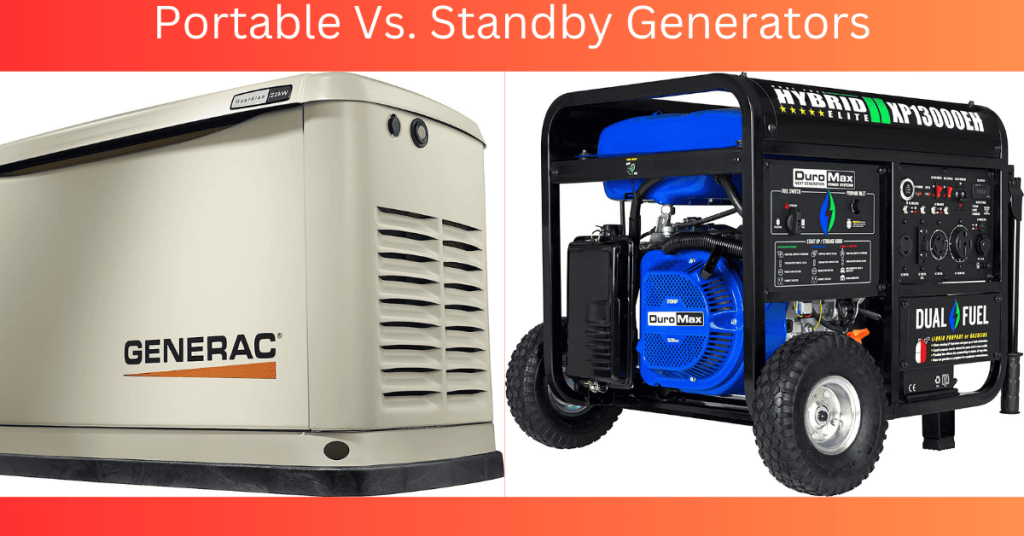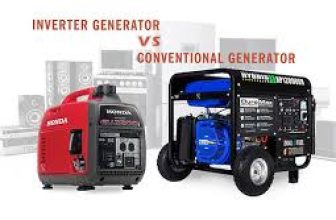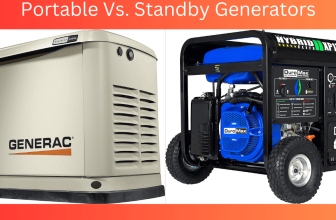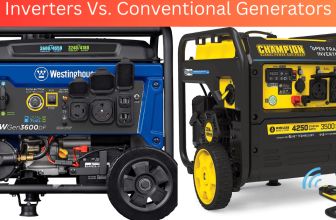As the saying goes, ‘Hope for the best, but prepare for the worst.’This couldn’t be more true when it comes to power outages. Whether it’s due to a severe storm or an unexpected equipment failure, losing electricity can cause major disruptions in our daily lives. That’s where generators come in. But with so many options out there, it can be overwhelming to choose the right one.
That’s why we’re here to compare two popular options: standby and portable generators. When it comes to power outages, a standby generator is the ultimate peace of mind. These units are permanently installed outside your home and automatically switch on within seconds of a power outage. They’re fueled by natural gas or propane, so you don’t have to worry about refueling them. Standby generators can power your entire home, including your heating and cooling systems, appliances, and electronics.
But with this convenience comes a higher price tag and installation costs. Is it worth it for your specific needs? That’s what we’ll explore in this article.
Key Takeaways
- Standby generators provide a permanent and reliable solution for frequent power outages, but come at a higher price tag and require more maintenance and installation costs.
- Portable generators are a more affordable option that can be easily moved and used for various purposes, but may not be as efficient and have a shorter lifespan.
- Fuel sources for generators include gasoline, propane, and natural gas, with each having its own advantages and disadvantages.
- Considerations when choosing a generator include power needs, noise level, safety features, and the size and type of space being powered. Consulting with a professional and weighing the cost against potential savings is also recommended.

Overview of Power Outages and the Need for Generators
When the power goes out, we all know how frustrating it can be. Everything comes to a halt, and we’re left in the dark, quite literally. It’s in these moments that we realize the importance of having a generator on standby or a portable one.
With a generator, we can keep the lights on, power our appliances and devices, and keep our homes comfortable. It can make a world of difference during a power outage.
Power outages can happen for a variety of reasons, from natural disasters to equipment failures. Regardless of the cause, they can be disruptive and dangerous. That’s why having a generator is essential.
A standby generator is a permanent fixture that’s installed outside your home. It’s connected to your electrical system, and it automatically kicks on when the power goes out. A portable generator, on the other hand, is a mobile unit that you can move around and use in different locations.
Now that we understand the need for a generator, let’s take a closer look at standby generators. They are designed to provide a seamless transition from grid power to generator power. They are connected to your home’s electrical system, so there’s no need to plug anything in or manually switch anything over.
Standby generators are also powerful, capable of powering your entire home, including your heating and cooling systems. They are ideal for those who want a hands-free solution to power outages.
Standby Generators
You’re not the type to sit in the dark, hoping for the power to come back on like some sort of medieval peasant. No, you prefer the luxury of a standby generator, ready to kick in at a moment’s notice and keep your home humming with all the modern amenities.
Standby generators are the ultimate power backup solution for homeowners who want uninterrupted power supply during outages. These generators are installed permanently outside your home and are connected to your electrical system. They are fueled by natural gas or propane, so you don’t have to worry about refueling them.
With a standby generator, you don’t have to lift a finger during an outage. The generator automatically detects when there’s a power outage and switches on immediately. It provides enough power to run all your essential appliances, including the refrigerator, lights, and HVAC system. You can even add more appliances to the generator’s power supply by installing a larger unit. Standby generators are also ideal for people with medical conditions that require continuous power supply.
But standby generators come at a cost. They are expensive to install and maintain, and you have to hire a professional to install them. Additionally, you’ll need to get a permit from your local authorities before installation.
That said, if you’re looking for a reliable, hassle-free power backup solution, a standby generator is your best bet.
Next, let’s take a look at portable generators, which are a more affordable option for power backup.
Portable Generators
If you’re looking for a backup power solution that doesn’t require a significant investment, consider opting for a portable generator. These units are designed to be moved easily from one location to another, making them ideal for people who need power on the go.
Here are some reasons why portable generators are a great option:
- Versatility: Unlike standby generators that are permanently installed, portable generators can be used in a variety of settings. They can be used to power tools on a job site, to keep the lights on during an outdoor event, or to provide power during a camping trip.
- Affordability: Portable generators are relatively inexpensive compared to standby generators. They’re a great option for people who need backup power but don’t want to spend a lot of money.
- Easy to use: Portable generators are simple to use and require little maintenance. They typically have pull-start engines and are powered by gasoline or propane.
- Mobility: As the name suggests, portable generators are designed to be moved easily. They come with wheels and handles that make it easy to transport them from one location to another.
As you can see, portable generators are a great option for people who need backup power but don’t want to spend a lot of money. In the next section, we’ll discuss the different fuel sources that can be used to power both standby and portable generators.
Fuel Sources
We’ll now dive into the discussion on the fuel sources for generators. As we all know, generators require fuel to run. The three most commonly used fuels are gasoline, propane, and natural gas.
Each fuel source has its pros and cons, and it’s important to understand them before making a decision on which one to use.
Gasoline
Gasoline can be a bit finicky when it comes to storing it for long periods of time. It tends to degrade over time, which can cause issues when trying to start your generator. To combat this, it’s recommended to add a fuel stabilizer to your gasoline before storing it. This will help prolong its lifespan and ensure that it’s ready to use when you need it.
Additionally, it’s important to store your gasoline in a cool, dry place away from any sources of heat or ignition. This will help prevent any accidents or damage to the fuel.
With proper storage and maintenance, gasoline can be a reliable fuel source for your standby or portable generator. However, if you prefer a more stable and long-lasting fuel source, propane may be a better option for you.
Propane
Propane is a fantastic alternative fuel source for your generator. It’s known for its stability and long shelf life. Unlike gasoline, propane does not break down over time, making it a reliable choice for backup power. It also burns cleaner than gasoline, producing fewer emissions and less pollution.
With the right setup, you can even run your generator on propane for days without having to worry about refueling. However, it’s important to note that propane generators may not be as efficient as those running on gasoline. Propane has a lower energy density, which means that it produces less power per unit of fuel.
This can result in a slightly lower output from your generator, which may not be noticeable for smaller appliances but could be a problem for larger ones. In the next section, we’ll explore another alternative fuel source for generators: natural gas.
Natural Gas
You might be surprised to learn that natural gas is another great alternative fuel source for your generator. Here are four reasons why you might want to consider natural gas:
- Convenience: Natural gas is delivered directly to your home through pipelines, so you don’t need to worry about refueling or storing fuel.
- Reliability: Unlike gasoline or propane, natural gas is available 24/7, so you can count on it during a power outage.
- Cleanliness: Natural gas burns cleaner than gasoline or propane, which means less maintenance and fewer emissions.
- Cost-effectiveness: Natural gas is often cheaper than other fuel sources, which can save you money in the long run.
If you’re looking for a reliable and cost-effective fuel source for your generator, natural gas might be the way to go. But what about the cost comparison between a standby generator and a portable generator?
Cost Comparison
Choosing a generator based on your needs and budget can be a difficult decision, but it’s important to keep in mind that standby generators typically come with a higher upfront cost.
In general, portable generators are more affordable and may be a good option for those looking for a temporary power source during an outage. However, standby generators are designed to provide a more permanent and reliable solution for homeowners who experience frequent power outages.
Although portable generators are cheaper, they may come with additional costs such as fuel, maintenance, and repair. Standby generators, on the other hand, are connected directly to your home’s electrical system and run on natural gas or propane. This means they require less maintenance and are more fuel-efficient in the long run.
While the initial cost may be higher, standby generators can provide peace of mind and a reliable source of power during longer outages. When considering the cost of a generator, it’s important to weigh the upfront cost against the potential savings over time.
Additionally, it’s important to consider the size and power capacity needed for your home. Factors such as the size of your home, the number of appliances you want to power, and your location can all impact the cost and effectiveness of a generator.
Before making a decision, it’s recommended to consult with a professional to determine the best generator for your specific needs.
Considerations Before Purchasing
Before we decide which type of generator to purchase, we need to consider a few key points.
First, we need to determine our power needs.
Second, we need to establish our budget and decide how much we’re willing to spend.
Third, we need to think about the noise level and safety features that come with each type of generator.
Power Needs
If you’re planning to host a party in your backyard, your standby generator may not be enough to power all the music, lights, and appliances you’ll need to keep your guests happy and comfortable. It’s important to consider your power needs before making a decision between a standby and portable generator.
Here are a few things to keep in mind:
- Think about the size of your home or event space. A larger area will require more power to keep everything running smoothly.
- Consider the number of people who’ll be using the electronics and appliances. The more people, the more power you’ll need.
- Think about the types of appliances and electronics you’ll be using. Some items, like air conditioners and refrigerators, require more power than others.
By taking these factors into account, you can make a more informed decision about which type of generator will work best for your needs.
Now, let’s talk about another important consideration: budget.
Budget
Now you’ll want to consider your budget and how much you’re willing to spend on a generator. Standby generators are typically more expensive than portable generators due to their larger size and permanent installation. On the other hand, portable generators are more affordable and can be purchased for a fraction of the cost of a standby generator.
To give you a better idea of the price difference between the two types of generators, we’ve created a table comparing the average cost of a standby generator and a portable generator based on their wattage output. As you can see, the cost of a standby generator increases significantly as the wattage output increases, while the cost of a portable generator remains relatively stable. Keep in mind that these prices are averages and can vary depending on the brand and specific features of the generator.
| Wattage Output | Standby Generator Cost | Portable Generator Cost |
|---|---|---|
| 5,000 – 7,500 | $3,000 – $5,000 | $500 – $1,500 |
| 10,000 – 12,500 | $5,500 – $8,000 | $1,500 – $3,000 |
| 15,000 – 17,500 | $8,000 – $11,000 | $3,000 – $5,000 |
| 20,000 – 22,500 | $11,000 – $14,000 | $5,000 – $7,500 |
Now that you have an idea of how much each type of generator generally costs, let’s move on to another important factor: noise level.
Noise Level
Consider how much of a headache noisy generators can be for you and your neighbors, so it’s worth taking the time to research the noise level of the generator you’re considering.
Here are some key points to keep in mind when comparing the noise level of standby and portable generators:
- Standby generators are typically quieter than portable generators, since they’re designed to be permanently installed and operate at a constant speed.
- However, many modern portable generators have noise-reducing features like sound-dampening enclosures and mufflers. Some models even have low-noise modes that can significantly reduce the decibel level.
- Noise levels are measured in decibels (dB), and a difference of just a few dB can make a big difference in how loud a generator sounds. For reference, a normal conversation is usually around 60 dB, while a vacuum cleaner is around 70 dB.
It’s important to consider not just the overall noise level of the generator, but also the specific frequency of the noise. Some frequencies are more annoying or disruptive than others, so look for generators that produce a low-frequency hum rather than a high-pitched whine.
Finally, keep in mind that noise level is not just a consideration for your own comfort, but also for the well-being of your neighbors. If you plan to use your generator in a densely populated area, be sure to choose a model that is as quiet as possible.
When it comes to choosing a generator, noise level is just one factor to consider. Safety features are another important consideration, since generators can be dangerous if not used properly.
Safety Features
One important aspect to keep in mind when selecting a generator is ensuring that it has the necessary safety features to prevent accidents. The last thing you want is to have a generator that is a hazard to use.
Portable generators come with various safety features, such as overload protection and low-oil shutoff, to prevent damage to the unit and ensure safe operation. Standby generators, on the other hand, have safety features such as automatic shutdown in case of a malfunction or electrical surge.
In addition to these safety features, it’s also important to consider the placement of the generator. Both portable and standby generators should be placed in a well-ventilated area to prevent carbon monoxide poisoning. This means that they should never be used indoors or in enclosed spaces.
By taking these necessary safety precautions, you can ensure that you can safely and confidently operate your generator, whether it’s a portable or standby unit.
Frequently Asked Questions
How do I properly maintain my standby generator?
To properly maintain your standby generator, we recommend conducting regular inspections, checking oil and coolant levels, and keeping the area around the generator clean and free from debris. It’s also important to run the generator for a short period every month to ensure it’s in good working order.
Can I use a portable generator indoors?
Absolutely not! Using a portable generator indoors is extremely dangerous and could result in carbon monoxide poisoning. We must always prioritize safety and follow manufacturer’s instructions.
How long will a typical portable generator run on a full tank of fuel?
On a full tank of fuel, a typical portable generator can run for around 8-12 hours, depending on the load and generator size. It’s important to monitor fuel levels and have extra on hand during extended power outages.
Can I connect my portable generator to my home’s electrical panel?
Yes, we can connect our portable generator to our home’s electrical panel with a transfer switch. It’s important to hire a licensed electrician to ensure proper installation and avoid dangerous backfeeding of electricity.
How do I safely store and dispose of fuel for my generator?
When storing fuel for our generator, we make sure to use a proper container and keep it in a cool, dry place away from any heat sources or ignition points. To dispose of old fuel, we take it to a hazardous waste facility.
Conclusion
So there you have it, folks. A tale of two generators – standby and portable.
Both have their advantages and disadvantages, and ultimately it comes down to personal preference and specific needs.
But one thing’s for sure, when the lights go out and the world goes dark, these generators become beacons of hope, shining their light and providing power in a time of need.
They are the superheroes of the electrical world, saving the day and bringing comfort to those who need it most.
So whether you choose a standby generator or a portable one, rest assured that you’ll have the power to weather any storm.





